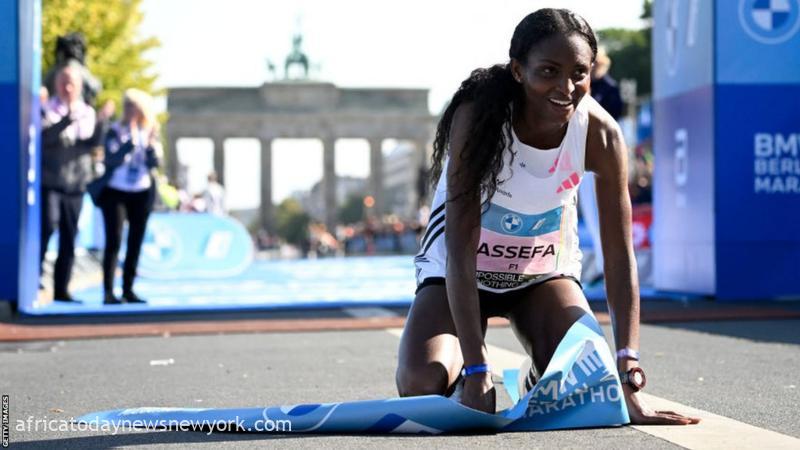Tigist Assefa of Ethiopia shattered the world record for the women’s marathon as she triumphed in Sunday’s Berlin race.
Assefa, the reigning champion from the previous year, posted a time of two hours, 11 minutes, and 53 seconds as she crossed the finish line.
Assefa not only secured victory but also broke the previous record of 2:14.04, established by Kenya’s Brigid Kosgei in the 2019 Chicago marathon, by more than two minutes.
Eliud Kipchoge, the double Olympic champion, secured his fifth win in Berlin’s men’s race, crossing the finish line in a record-breaking time of 2:02.42.
At the age of 38, the Kenyan athlete made history by clocking 2:01.09 in Berlin last year, a feat that brought him on par with Ethiopian icon Haile Gebrselassie, who also had four wins.
Berlin has now seen its 13th world record as Assefa’s winning time is added to the list. Her previous year’s victory in 2:15.37 had stood as the third-fastest women’s marathon in history at that time.
‘I am very happy,’ she said. ‘I wanted to break the marathon world record, but I couldn’t imagine that it would result in a time under 2:12.’
Starting as an 800m specialist, Assefa made her marathon debut in April of the previous year.
Read also: War Crimes Persist In Ethiopia Despite Peace Deal – UN
Assefa, upon her return to Berlin, immediately signalled her intentions by launching into a lightning-quick pace and reaching the halfway mark in just one hour, six minutes, and 20 seconds.
Assefa was among six women who were on track for a world record at that point. She managed to maintain her speed, and at the 37km mark (23 miles), she was only three seconds per kilometer behind Kipchoge’s time from the same stage on Sunday.
Despite recording his slowest marathon time of 2:09.23 and securing a surprising sixth-place finish in Boston in April, Kipchoge asserted after the Berlin race that he had been confident in his ability to break the world record he had set just the year before.
In the initial phases, he was poised for a sub-two-hour performance, and later, he remained in contention to surpass his own record. However, he gradually lost pace for both milestones. At the halfway mark, he clocked 1:00.21, slightly behind his world record split of 59:51.
In 2019, Kipchoge completed a marathon in less than two hours in Vienna, but it didn’t receive official world record status because it wasn’t run as an open competition, and he employed a team of pacemakers who rotated.
Kipchoge’s performance in Berlin has been outstanding, with five victories in six appearances, and he has an impressive overall record of 16 wins in 19 races, which includes the 2016 and 2020 Olympics.
Sunday’s performance by Kipchoge is now the eighth fastest marathon time ever recorded. Remarkably, he can lay claim to five of the top eight times, highlighting his ambition to become the first athlete to win three Olympic marathons next year.
‘I was expecting to do the same [break the record], but it did not come, that’s how sport is,’ he said. ‘Every race is a learning lesson.’
‘I’ll put all my experience of my 21 marathons into next year in the Olympics in Paris and try to be the first to win for the third time, but I would also be happy with the podium.’

